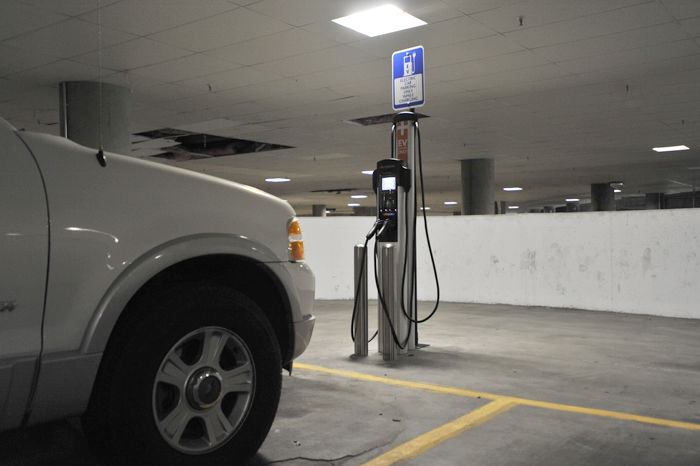Electric vehicle charging stations come to WSU
A car parked in front of the electric vehicle charging station in the parking garage beneath the Terrell Library.
September 1, 2016
There is now a trio of electric vehicle (EV) charging stations for students, residents and Pullman visitors, as of Tuesday.
The 24/7 stations are located in the parking garages of the Smith Center (CUE) and the Terrell Library, according to a WSU press release.
“We are very excited to bring EV charging technology to the WSU Pullman campus and offer this service to our regular parking patrons and visitors to our campus,” said Chris Boyan, WSU assistant director of operations at Transportation Services.
Two days before WSU announced the addition of the two new stations, ChargePoint, Inc. announced in an Aug. 28 news release that it reached a milestone of 30,000 charging stations, triple the amount of Starbucks locations in the U.S. ChargePoint is the electric vehicle infrastructure company that produced the stations.
Previously, Pullman only had one EV charging station, which was located at the Palouse Business Center, two miles away from the two new WSU locations.
Boyan said he does not anticipate many people initially using the stations to charge electric vehicles, as there are “only a handful in the area.”
However, Boyan said he sees growth in the future.
“Electrical vehicles are on the rise and we wanted to keep up with the times,” Boyan said.
He said that visitors who come to Pullman will have a place to charge their cars.
“A strong and growing charging infrastructure will be essential as EV sales increase to an expected 25 percent of the market by 2025,” ChargePoint stated in its news release.
While much progress has been made, there is still an increased demand to build more charging stations, according to the news release.
Consumer Reports states that prices for cars range from $21,750 for the Smart Electric Drive to over $125,000 for the Tesla Model S. The price of EV batteries, which accounts for the majority of the cost of electric vehicles, have precipitously dropped in price over the last five years, according to the United Nations-backed report, Global Trends in Renewable Energy Investment 2016.
Tech Insider reported that EV batteries will be cost-competitive with gas vehicles once they drop to $150 per kilowatt hour (kWh), and that the cost per kWh in 2010 decreased from $1,000 to $350 in 2015.
The EV stations are among the many eco-friendly initiatives implemented by WSU Transportation Services, including Zipcar, the Green Bikes and the Pullman Transit buses, all of which are available to WSU students, Boyan said.
very excited to bring EV charging technology to the WSU Pullman campus and offer this service to our regular parking patrons and visitors to our campus,” said Chris Boyan, WSU assistant director of operations at Transportation Services.
Two days before WSU announced the addition of the two new stations, ChargePoint, Inc. announced in an Aug. 28 news release that it reached a milestone of 30,000 charging stations, triple the amount of Starbucks locations in the U.S. ChargePoint is the electric vehicle infrastructure company that produced the stations.
Previously, Pullman only had one EV charging station, which was located at the Palouse Business Center, two miles away from the two new WSU locations. Boyan said he does not anticipate many people initially using the stations to charge electric vehicles, as there are “only a handful in the area.”
However, Boyan said he sees growth in the future.
“Electrical vehicles are on the rise and we wanted to keep up with the times,” Boyan said.
He said that visitors that come to Pullman will have a place to charge their cars.
“A strong and growing charging infrastructure will be essential as EV sales increase to an expected 25 percent of the market by 2025,” ChargePoint stated in its news release.
While much progress has been made, there is still an increased demand to build more charging stations, according to the news release.
Consumer Reports states that prices for cars range from $21,750 for the Smart Electric Drive to over $125,000 for the Tesla Model S. The price of EV batteries, which accounts for the majority of the cost of electric vehicles, have precipitously dropped in price over the last five years, according to the United Nations-backed report, Global Trends in Renewable Energy Investment 2016.
Tech Insider reported that EV batteries will be cost-competitive with gas vehicles once they drop to $150 per kilowatt hour (kWh), and that the cost per kWh in 2010 decreased from $1000 to $350 in 2015.
The EV stations are one of the many eco-friendly initiatives implemented by WSU Transportation Services, including Zipcar, the Green Bikes and the Pullman Transit buses, all of which are available to WSU students, Boyan said.










